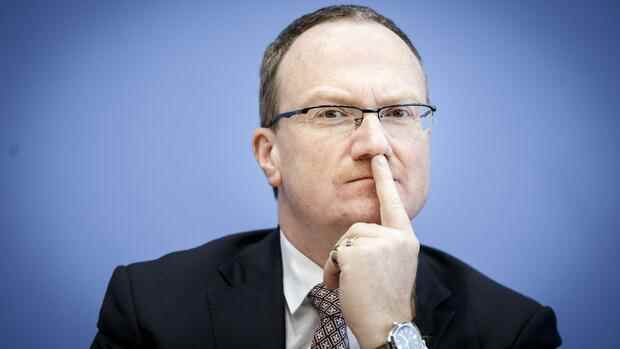Berlin Former economic wise man Lars Feld has sharply criticized the coalition agreement with a view to pension policy. “What the SPD has achieved without the FDP and the Greens slowing them down is not sustainable,” he told the Handelsblatt.
On Wednesday the SPD, Greens and FDP presented their coalition agreement. It provides for the pension level to be fixed at at least 48 percent, the contributions should not rise above 20 percent in the next four years, and the retirement age should remain unchanged.
According to Feld, the pension insurance could no longer finance itself in this way in the future. He demands: “No ifs or buts, the retirement age must be increased.”
Feld, however, had praise for financial policy. “The coalition agreement calms me down. The feared escalating financial policy will not come, ”said the President of the Freiburg Eucken Institute. According to the coalition agreement, the debt brake should apply again from 2023. However, various measures are shown in order to nevertheless guarantee additional financial leeway for investments in climate protection.
Top jobs of the day
Find the best jobs now and
be notified by email.
Feld had repeatedly warned against such “tricks”, but considers the current structure to be in order. “A few years ago, and with a different government constellation, the program would have made me more nervous. But with everything that has been discussed in the past few weeks, I consider the result to be justifiable. “
Read the whole interview here:
Mr. Feld, do you recognize in the coalition agreement the new beginnings that the SPD, Greens and FDP are proclaiming for themselves?
At least I recognize the effort to start modernization. Climate protection, faster approval and planning procedures and a European guiding principle show the claim.
Demand and reality often diverge.
The traffic light politicians seem to be clear about this. The coalition agreement shows the desires, but also the difficulties they come with.
Do you have an example?
This becomes very clear with climate protection, for example. I thought it was conceivable that people would actually not trust the market and that by intervening heavily on the market they thought they could implement better climate protection. But that’s not how it turned out. Instead, the market-based approach with the CO2 price as the central instrument has prevailed. There should be contracts for differences and an industrial strategy. In principle, however, one thing is clear: it will only be possible to fix it with instruments that are in line with the market.
In financial policy, however, there is no clear picture. The debt brake should apply again from 2023. At the same time, the parties leave various options for getting into debt open to the rule, such as loan programs at Deutsche Bahn, public-private partnerships (PPP) or an expansion of the state-owned KfW bank. You had repeatedly warned against such “tricks”.
I did, but from my point of view there is no cause for concern. The feared escalating financial policy will not come. All sorts of possibilities for circumventing the debt brake and for additional debt are shown. But the “tricks”, when used, are strictly controlled and generally remain limited.
The cyclical component of the debt brake is evaluated according to the scientific findings of the last ten years and not softened according to unscientific procedures. In particular, no investment companies appear as legally independent special funds that would have been a permanent bypass of the debt brake.
However, this limitation is not too specific. Example of PPP: Such constructs are mentioned as an option – and they would run alongside the actual budget.
At the same time, however, the core tasks of the state will continue to be financed by the public purse, and PPPs pay close attention to economic efficiency and the assumption of risk.
More on the topic of traffic light government
Well, the government will be able to define the core tasks as it suits it.
However, the coalition agreement shows sufficient financial leeway for the Ampel projects. Climate-damaging subsidies are to be reduced, and there is to be a general revision of expenditure. I admit: a few years ago, and with a different government constellation, the program would have made me more nervous. But with everything that has been discussed in the past few weeks, I consider the result to be justifiable.
Does that also apply to the pension?
Absolutely not. The pension is the black spot in the coalition agreement. What the SPD has achieved without the FDP and the Greens slowing it down is not sustainable. The pension level should be fixed at at least 48 percent, the contributions should not rise above 20 percent in the next four years, and the retirement age should never be touched. But demographic change will strike from 2025. And then?
Stock pensions, immigration and the catching-up factor won’t fix it?
The entry into the share pension and the strategy for the immigration of skilled workers do not solve the problems of the pay-as-you-go statutory pension insurance. I support both projects, but they will not be enough. Only the catching up factor helps …
… which says that if wages fall, the pension increases in the following years will be lower as compensation, because pension cuts are excluded beforehand …
… and which has been nonsensically exposed for a few years. Now the catch-up factor should apply again, starting next year, so that the pension increase will not amount to 5.2 percent in the west and 5.9 percent in the east, but only about half. That will help the finances of the pension insurance for the next four years, but it will not be enough to put the pension on safe feet in the long term. No ifs or buts, the retirement age must be increased. If the government backs off now for another four years, it will only postpone the problem to the next legislative period.
More: What the future traffic light government can score with economists
